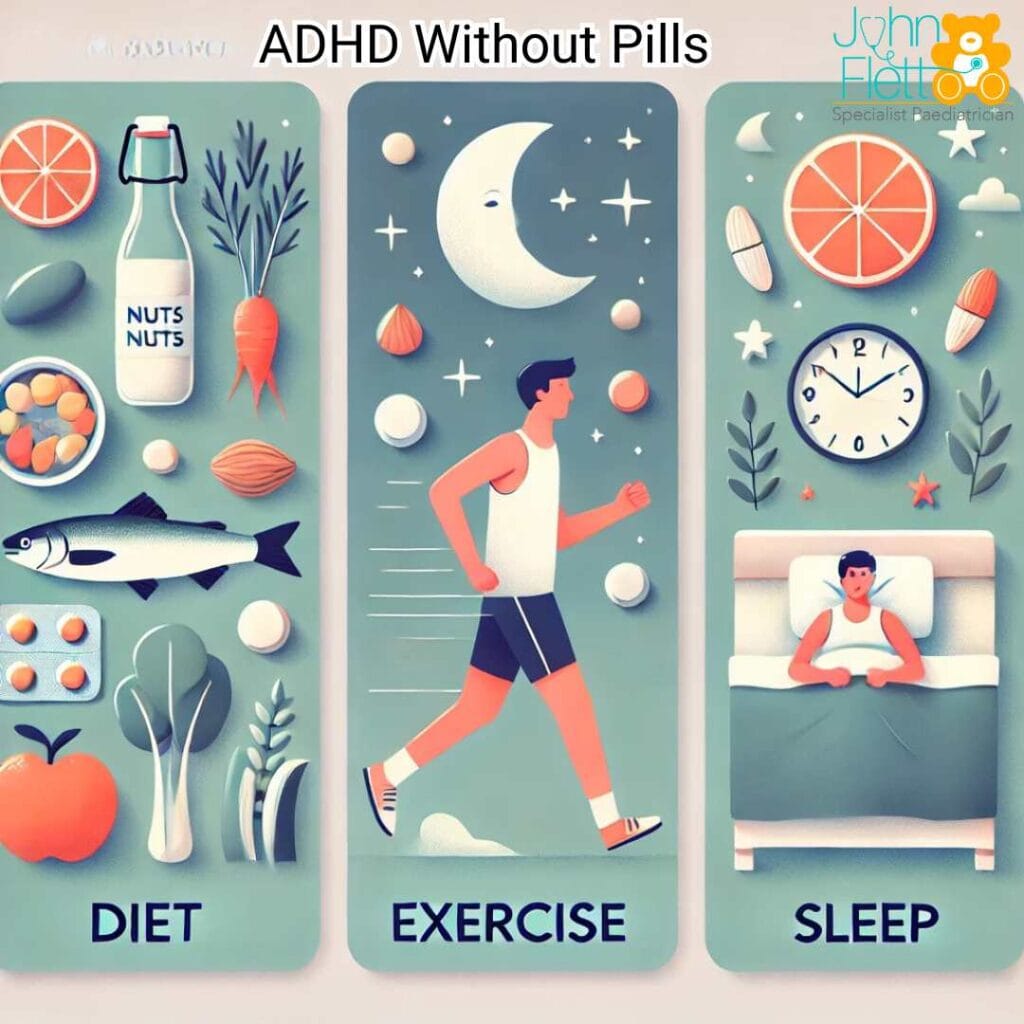ADHD Without Pills – Evidence-Based Approaches Beyond Medication

Part 1: Diet and ADHD
Part 1: Fueling Focus – How a Balanced Diet Can Help Manage ADHD Symptoms Naturally
When we think of ADHD management, diet isn’t usually the first solution that comes to mind. Yet, emerging research and real-world experiences highlight that a well-rounded, nutrient-dense diet can make a big difference. While there is no “ADHD diet” that cures the condition, focusing on foods that support brain health, mood stability, and consistent energy levels can play a powerful role in helping children and adults alike manage their symptoms.
Let’s dive into how key dietary choices can support focus and emotional balance.
1. Protein-Rich Meals: Fueling Brain Function
Protein is essential for neurotransmitter production, particularly dopamine and norepinephrine, both of which are directly involved in focus, motivation, and emotional regulation. Studies have shown that children with ADHD can benefit from including a protein source at every meal, which helps maintain steady blood sugar levels and prevent the energy dips that can worsen symptoms.
What to Include:
- Breakfast: Scrambled eggs or a Greek yoghurt bowl with nuts and berries.
- Lunch: A lean chicken or tofu wrap, or beans and cheese on whole-grain toast.
- Dinner: Grilled salmon or chickpea salad with a side of quinoa.
Why It Matters: Protein slows down digestion, which prevents sudden spikes and crashes in energy. By stabilising blood sugar, it supports a more consistent mood and helps manage impulsive behaviours throughout the day.
2. Omega-3 Fatty Acids: Supporting Cognitive Function and Reducing Impulsivity
Omega-3 fatty acids are crucial for brain health and cognitive function. These essential fats, found abundantly in fatty fish like salmon, walnuts, flax seeds, and chia seeds, have been linked to improved focus and a reduction in impulsive behaviour. Research suggests that children with ADHD often have lower levels of omega-3s, so incorporating these fats or considering a supplement can be highly beneficial.
What to Include:
- Weekly Fish: Try including oily fish, like salmon or mackerel, 2–3 times a week.
- Plant-Based Options: Walnuts, chia seeds, and flaxseeds are excellent sources for non-fish eaters.
- Supplements: For kids or adults who are not big fish fans, omega-3 supplements (usually derived from fish oil or algae) can be an effective alternative.
Why It Matters: Omega-3s support the development of the brain’s prefrontal cortex, which is involved in decision-making, focus, and impulse control — all of which are critical in managing ADHD.
3. Limiting Sugar and Processed Foods: Reducing Irritability and Energy Crashes
For children with ADHD, sugar and processed foods can be especially problematic, leading to sudden bursts of energy followed by inevitable crashes. This rollercoaster of blood sugar levels can exacerbate mood swings and make it harder to stay focused.
What to Include:
- Natural Sweeteners: Use options like honey or fruit for a sweet treat.
- Healthy Snacks: Swap chips or sweets with fruit, nut butter on apple slices, or a handful of nuts.
- Whole Foods: Whole grains like oats, brown rice, and whole-wheat products provide steady energy without the drastic peaks and troughs caused by sugary foods.
Why It Matters: Reducing sugar helps stabilise mood and focus, providing a more even energy distribution throughout the day, especially crucial for children prone to impulsivity and irritability.
4. Hydration: The Often Overlooked Key to Concentration
Dehydration, even at mild levels, can reduce concentration and increase irritability, which is why staying hydrated is particularly important for those with ADHD. Simple steps like having a water bottle on hand or infusing water with fruit for flavour can encourage better hydration.
What to Include:
- Daily Water Intake: Aim for six to eight glasses of water daily.
- Water-Rich Snacks: Foods like cucumbers, oranges, and watermelons contribute to hydration as well.
Why It Matters: Staying hydrated helps maintain cognitive function, allowing for better focus, emotional regulation, and physical energy.
Putting It All Together: A Balanced ADHD-Friendly Plate
For those looking to take a diet-first approach to ADHD management, combining protein, omega-3s, and whole foods with plenty of hydration can make a significant impact. Preparing meals that meet these nutritional goals may take a little planning but can provide powerful, sustainable results for focus and emotional stability.
Example Meal Plan:
- Breakfast: Scrambled eggs with avocado and a side of whole-grain toast.
- Lunch: Tuna salad wrap with a side of carrot sticks and hummus.
- Dinner: Baked salmon with roasted sweet potatoes and steamed broccoli.

Responses